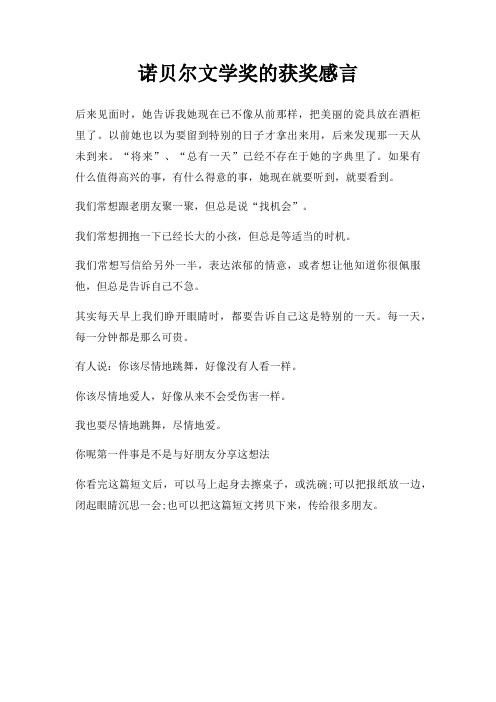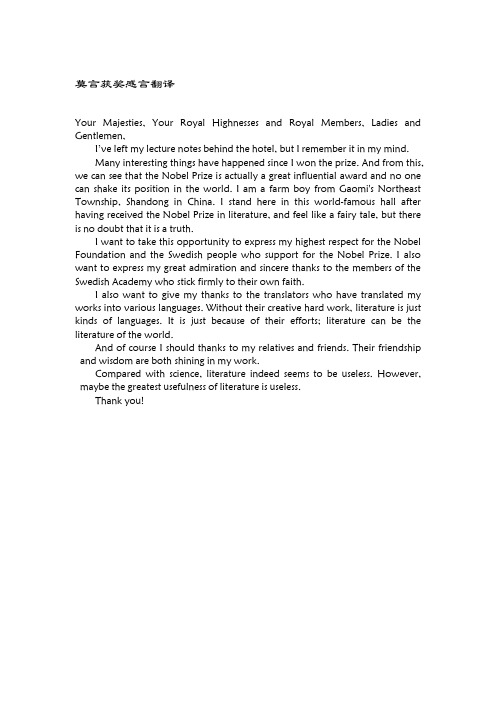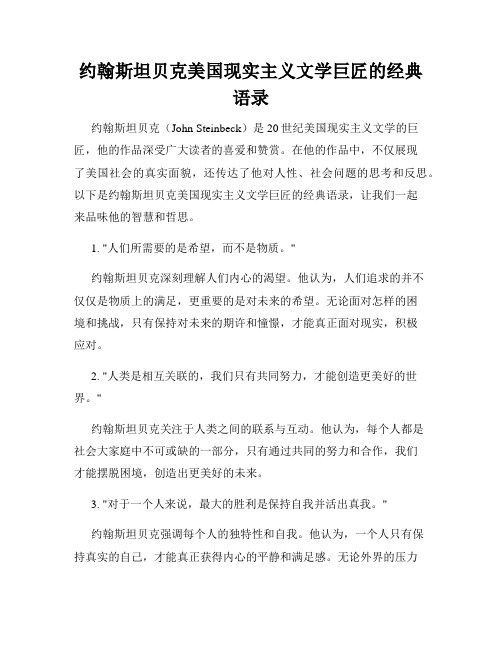约翰斯坦贝克诺贝尔文学奖的英文获奖感言
诺贝尔文学奖获得者鲍勃·迪伦获奖感言中英双语

诺贝尔文学奖获得者鲍勃·迪伦获奖感言中英双语导读:我不知道这些男人和女人们是否曾经想过自己能够获得诺贝尔文学奖,但我想,在这个世界的任何地方,任何写过一本书、一首诗、或是一部戏剧的人,在内心深处都会拥有这么一个秘密的梦想。
瑞典当地时间12月10日下午4点30分,2016年诺贝尔奖颁奖仪式在瑞典斯德哥尔摩音乐厅正式举行。
文学奖得主鲍勃·迪伦因事未能出席。
此前,鲍勃·迪伦已提前知会诺奖评委会,他会缺席这次领奖,而由有着“朋克教母”之称的美国女歌手、诗人帕蒂·史密斯代为领奖,并演唱鲍勃·迪伦1963年经典作品《大雨将至》。
他的获奖感言由美国驻瑞典大使代为朗读。
以下为鲍勃·迪伦获奖感言:很抱歉,我没能与你们在一起,但请知道,在精神上,我绝对与你们同在,很荣幸获得了这么一个有声望的奖。
被授予诺贝尔文学奖,是我从来不敢想象或预见到的事情。
从小,我就熟悉、阅读并受益于那些被认为值得获得该项殊荣的人的作品:吉卜林、托马斯·曼、赛珍珠、加缪、海明威这些文学巨人总是给人深刻的印象,他们的作品在学校课堂上被教授,被收藏在世界各地的图书馆,被人们用虔诚的语调谈论着。
现在我加入这样的名列,真的难以言说。
我不知道这些男人和女人们是否曾经想过自己能够获得诺贝尔文学奖,但我想,在这个世界的任何地方,任何写过一本书、一首诗、或是一部戏剧的人,在内心深处都会拥有这么一个秘密的梦想。
这个梦想被埋藏得太深,他们甚至都不知道它在那里。
有人曾告诉我,我不可能获得诺贝尔奖,我也不得不认为这个几率与我站在月球上的几率相同。
事实上,在我出生的那一年和随后的几年,世界上没有一个人被认为优秀得可以赢得诺贝尔奖。
所以,我认为,至少可以说,我现在属于这个非常少数的群体。
收到这个令人惊讶的消息时,我正在路上。
我花了好几分钟才确定它没错。
我开始回想起威廉·莎士比亚这位伟大的文学人物。
诺贝尔文学奖获奖感言

诺贝尔文学奖的获奖感言
后来见面时,她告诉我她现在已不像从前那样,把美丽的瓷具放在酒柜里了。
以前她也以为要留到特别的日子才拿出来用,后来发现那一天从未到来。
“将来”、“总有一天”已经不存在于她的字典里了。
如果有什么值得高兴的事,有什么得意的事,她现在就要听到,就要看到。
我们常想跟老朋友聚一聚,但总是说“找机会”。
我们常想拥抱一下已经长大的小孩,但总是等适当的时机。
我们常想写信给另外一半,表达浓郁的情意,或者想让他知道你很佩服他,但总是告诉自己不急。
其实每天早上我们睁开眼睛时,都要告诉自己这是特别的一天。
每一天,每一分钟都是那么可贵。
有人说:你该尽情地跳舞,好像没有人看一样。
你该尽情地爱人,好像从来不会受伤害一样。
我也要尽情地跳舞,尽情地爱。
你呢第一件事是不是与好朋友分享这想法
你看完这篇短文后,可以马上起身去擦桌子,或洗碗;可以把报纸放一边,闭起眼睛沉思一会;也可以把这篇短文拷贝下来,传给很多朋友。
莫言获诺贝尔奖致辞英语

莫言获奖感言翻译Your Majesties, Your Royal Highnesses and Royal Members, Ladies and Gentlemen,I’ve left my lecture notes behind the hotel, but I remember it in my mind.Many interesting things have happened since I won the prize. And from this, we can see that the Nobel Prize is actually a great influential award and no one can shake its position in the world. I am a farm boy from Gaomi's Northeast Township, Shandong in China. I stand here in this world-famous hall after having received the Nobel Prize in literature, and feel like a fairy tale, but there is no doubt that it is a truth.I want to take this opportunity to express my highest respect for the Nobel Foundation and the Swedish people who support for the Nobel Prize. I also want to express my great admiration and sincere thanks to the members of the Swedish Academy who stick firmly to their own faith.I also want to give my thanks to the translators who have translated my works into various languages. Without their creative hard work, literature is just kinds of languages. It is just because of their efforts; literature can be the literature of the world.And of course I should thanks to my relatives and friends. Their friendship and wisdom are both shining in my work.Compared with science, literature indeed seems to be useless. However, maybe the greatest usefulness of literature is useless.Thank you!。
诺贝尔文学奖获奖感言_获奖感言_

诺贝尔文学奖获奖感言诺贝尔文学奖(略萨)我五岁学会阅读。
那是在玻利维亚科恰班巴的萨耶学校,胡斯蒂尼亚诺修士的课堂上。
这是我一生中最重要的事情。
而今,近七十年时光不再,可我还清楚记得那个魔法如何丰富了我的生活:将书中的文字转化为形象;打破时空屏障,让我同尼莫船长(《海底两万里》人物)一起遨游海底两万里,同达达尼昂、阿托斯、波尔多斯以及阿来米斯(《三个火枪手》人物)并肩作战,粉碎诡计多端的红衣主教黎塞留旨在推翻王后的阴谋,让我化身冉阿让扛着马吕斯(《悲惨世界》人物)那奄奄一息的躯体在巴黎的内脏中跼蹐前行。
阅读把梦想变成生活,又将生活变成梦想,让孩童如我亦能触及文学的广袤天地。
我母亲曾经对我说,我最初的习作其实就是我所读故事的延续,因为我总是为故事的终结而伤心,或是想要改变故事的结局。
或许我一生都在做一件事,尽管我自己全然不知,那就是:从成长到成熟,再到终老,我都在延续着那些令我的童年充满冒险和激动的故事。
我真希望母亲此刻也在这里,她读到阿玛多·内尔沃和巴勃罗·聂鲁达的诗歌时总是动情至流泪。
我也希望佩德罗姥爷在这里,他长着一个大鼻子,头顶秃得铮亮。
他总是对我的诗句赞赏有加。
还有卢乔舅舅,他鼓励我全身心投入到写作之中,尽管彼时彼地从事文学创作甚至都无法填饱肚子。
一生中,我身边满是像他们一样的人,爱护我,鼓励我,在我彷徨的时候,将他们的信念传递给我。
正是由于他们,当然,也凭着我的执着和一点点运气,我得以将自己的大部分时间投入到这项集激情、嗜好和奇迹于一身的事业中来。
这事业就是写作。
写作让我们开启另一段平行的人生,让我们得以逃避生活的不如意;写作是化习常为神奇,又化神奇为习常;它驱散混沌,点石成金,使瞬间永存,视死亡如过眼云烟。
写故事并不容易。
故事变成文字的那一刻,一切的计划都枯萎在纸上,思想和形象也都失去了活力。
怎样才能重新将它们激活呢?我们很幸运,大师们就在那里,我们可以向他们学习,遵从他们的榜样。
约翰斯坦贝克美国现实主义文学巨匠的经典语录

约翰斯坦贝克美国现实主义文学巨匠的经典语录约翰斯坦贝克(John Steinbeck)是20世纪美国现实主义文学的巨匠,他的作品深受广大读者的喜爱和赞赏。
在他的作品中,不仅展现了美国社会的真实面貌,还传达了他对人性、社会问题的思考和反思。
以下是约翰斯坦贝克美国现实主义文学巨匠的经典语录,让我们一起来品味他的智慧和哲思。
1. "人们所需要的是希望,而不是物质。
"约翰斯坦贝克深刻理解人们内心的渴望。
他认为,人们追求的并不仅仅是物质上的满足,更重要的是对未来的希望。
无论面对怎样的困境和挑战,只有保持对未来的期许和憧憬,才能真正面对现实,积极应对。
2. "人类是相互关联的,我们只有共同努力,才能创造更美好的世界。
"约翰斯坦贝克关注于人类之间的联系与互动。
他认为,每个人都是社会大家庭中不可或缺的一部分,只有通过共同的努力和合作,我们才能摆脱困境,创造出更美好的未来。
3. "对于一个人来说,最大的胜利是保持自我并活出真我。
"约翰斯坦贝克强调每个人的独特性和自我。
他认为,一个人只有保持真实的自己,才能真正获得内心的平静和满足感。
无论外界的压力和诱惑如何,只要坚持信仰,并保持真实的自己,就能取得最大的胜利。
4. "人性的善良是无穷的,只有在最黑暗的时刻,我们才能看到它的光芒。
"约翰斯坦贝克对人性持有积极的态度。
他相信人性本善,并认为无论多么黑暗的时刻,人们内心深处总会存在着善良和正义的火花。
只有在面临困难和挑战之际,我们才能看到人性的光芒。
5. "社会不应该定义一个人的价值,每个个体都应该被尊重和平等对待。
"约翰斯坦贝克批判了社会对个体的标签化和歧视现象。
他认为,每个人都应该被平等地对待,不论他们的社会地位、职业、种族等。
每个人都有自己的独特价值,社会应该给予每个人平等的机会和尊重。
6. "人们对未知的恐惧超过了对现实的忍受。
The_Making_of_a_New_Yorker_成为纽约人

New York is the only city I have ever lived in. I have lived in the country, in the small town, and in New York. It is true I have had apartments in San Francisco, Mexico City, Los An-geles, Paris, and sometimes have stayed for months, but that is a very different 【导读】约翰·斯坦贝克年凭借长篇小说《愤怒的葡萄》奖,1962年又凭借小说尔文学奖。
斯坦贝克出生在加利福尼亚一个叫萨利纳斯的小镇,后来定居纽约。
本文最早发表在他1925年初到纽约,并逐渐爱上这座城市的过程。
扫码听读frog in a small puddle, if he kicks his feet is able to make waves, get mud in his neighbor’s eyes—make some im-pression. He is known. His family is known. People watch him with some interest, whether kindly or maliciously. He comes to New York and no matter what he does, no one is impressed. He challenges the city to fight and it licks him without being aware of him. This is a dreadful blow to a small town ego. He hates the organism that ignores him. He hates the people who look through him.11 And then one day he falls into place, accepts the city and does not fight it any more. It is too huge to notice him and suddenly the fact that it doesn’t notice him becomes the most delightful thing in the world. His self-consciousness evaporates. If he is dressed superbly well—there are half a million people。
约翰斯坦贝克介绍JohnSteinbeck
• 14.当今全世界的恐惧,起源于我们对现实 世界中某些危险因素突飞猛进的掌控。
• 15.诚然,对其他层面的理解还没有跟上技 术的进步,但人们不会就此推定他们永不 能并驾齐驱。实际上,这也是作家的责任。
It is the story of a family from Oklahoma who are evicted from their small farm when they cannot pay their debts. His style and point of view
• During the Depression years, his fiction combined warm humor, regionalism, and violence with a realistic technique which produced a unique kind of social protest.
了炸药的力量,使之既有美好的创造性,又有摧 He wrote sympathetically about poor, oppressed California farmers, migrants, laborers, and the unemployed, making
their lives and sorrows very understandable to his readers. Major Works
• 8.人类经历过一段灰色而荒颓的混乱年代。我伟 大的先驱者,福克纳曾在这里演讲,提起过这个 年代的悲剧,是长久弥漫全世界的肉体恐惧使人 们再无法感受到心灵,以致似乎只有人的内心和 人类自身的冲突才是值得描写的。
约翰-纳什在诺贝尔颁奖礼上的获奖感言
分类:感言与杂谈: 小约翰.福布斯.纳什(John Forbes Nash Jr)纳什(John Forbes NashJr,1928-6-13)1994年如愿以偿,因对博弈论的研究而荣获诺贝尔经济学奖。
1994年12月,约翰-纳什在瑞典斯得歌尔摩的诺贝尔颁奖礼上发表获奖感言:“我一直相信数字,不管是方程式或是逻辑学都引导我们去思考。
但经过终生的追求,我问逻辑到底是什么,谁去决定原由?我的探索让我从行而下到行而上,最后到了妄想症,就这样来回走了一遍。
在事业上我有最重大的突破,在生命中找到了最重要的人。
只有在这神秘的爱情方程式中,才能找到逻辑或由来。
今晚我能站在这里全是你的功劳,你是我成功的因素,也是唯一的因素!谢谢你!”这一感言颇得人们赏识,并广为流传。
在神秘的爱情方程式中求解,并经过“从行而下到行而上”的轮回,成功后唯一谢的是那位对他引入了一个从来没有认真考虑过的观念----爱情--的艾丽西亚。
纳什是普林斯顿有名的数学天才,却在风华正茂、创造力最佳之际患精神分裂症,在随后的30年中几乎成为一个废人,是艾丽西亚向纳什引入了一个从来没有认真考虑过的观念----爱情--激活了他生命的活力。
受到她那坚贞不渝的爱情和忠诚的感动,纳什最终决定与这场被认为是只能好转、无法治愈的疾病作斗争。
处在病魔的重压之下,他仍然被那令人兴奋的数学理论所驱使着,他决心寻找自己的恢复常态的方法。
绝对是通过意志的力量,他才一如既往地继续进行着他的工作,并于1994年获得了诺贝尔奖。
----“竞争中的数学”----大胆地将现代经济之父亚当-斯密(Adam Smith)的理论做出了不同的解释。
这个已经被人们接受了150年的思想突然变得陈旧过时了,纳什的生活也从此发生了改变。
与此同时,他在博弈论方面颇具前瞻性的工作成为20世纪最具影响力的理论,而纳什也成了一个不仅拥有美好情感,并具有美丽心灵的人。
他最后竟然奇迹般地康复了。
就是这样一位数学奇才,在诺贝尔奖揭晓之际讲了三件事,一般人想不到的三件事:1。
约翰·斯坦贝克语录
约翰·斯坦贝克语录以下是约翰·斯坦贝克的一些经典语录:1. "The writer must believe that what he is doing is the most important thing in the world." - From "East of Eden"(作家必须相信自己所做的是世界上最重要的事情。
——出自《伊甸园东》)2. "I have come to believe that a great teacher is a great artist and that there are as few as there are any other great artists. Teaching might even be the greatest of the arts since the medium is the human mind and spirit." - From "Journal of a Novel: The East of Eden Letters"(我开始相信,伟大的教师就是伟大的艺术家,而像其他伟大的艺术家一样,他们并不多见。
教学可能是最伟大的艺术形式,因为它的媒介就是人类的思想和精神。
——出自《小说日记:《伊甸园东》的信》)3. "A journey is like marriage. The certain way to be wrong is to think you control it." - From "Travels with Charley: In Search of America"(旅行就像婚姻。
错误的方法就是认为你可以掌控它。
——出自《与查理的旅行:寻找美国》)4. "I wonder how many people I've looked at all my life and never seen." - From "The Winter of Our Discontent"(我不知道有多少人我一生中看过却从未真正看见。
约翰·斯坦贝克语录
约翰·斯坦贝克语录约翰·斯坦贝克语录:在黑暗中,我依然看到星星的光芒约翰·斯坦贝克是美国著名作家,他的作品常常揭示人性的复杂性和社会的不公平。
他的语录中充满了对人类生存的深刻思考和对希望的坚定信念。
在他的作品中,他常常以黑暗和困境为背景,但他同时也描绘了人们在逆境中仍然能够发现光明的能力。
在这个世界上,我们经历了无数的黑暗时刻。
无论是个人的挫折,还是全球范围的灾难,我们都会遭遇困境和挑战。
然而,正是在这些黑暗的时刻,我们才能看到真正的勇气和坚韧。
斯坦贝克的语录中提到的“在黑暗中,我依然看到星星的光芒”,意味着即使在最困难的时刻,我们仍然能够找到希望和前进的动力。
这种信念和乐观的态度是我们在面对挑战时必不可少的品质。
当我们身陷困境时,我们往往会感到绝望和无助。
然而,正是在这个时候,我们需要记住斯坦贝克的话语。
即使在最黑暗的时刻,星星的光芒仍然存在。
这个比喻告诉我们,即使我们感到绝望,我们仍然可以找到一线希望,只要我们愿意去寻找。
斯坦贝克的作品中经常描绘了贫困、社会不公和人性的黑暗面。
然而,他从不忘记提醒我们,即使在这些困境中,我们仍然可以找到光明。
他用文字和故事告诉我们,即使在最糟糕的情况下,我们仍然可以保持信念和希望。
正如斯坦贝克所说:“在黑暗中,我依然看到星星的光芒”,这句话提醒我们,无论我们面对什么样的困境,我们都应该保持信念和希望。
在黑暗中,我们可能看不到光明的道路,但我们可以相信它的存在。
只要我们坚持下去,我们就能够找到前进的方向。
斯坦贝克的语录是对人类坚韧和乐观精神的赞美。
它鼓励我们在困境中寻找希望,并相信在黑暗中仍然有星星的光芒。
无论我们面对什么样的挑战,我们都应该记住这句话,并相信我们有能力克服困难,追求更好的未来。
- 1、下载文档前请自行甄别文档内容的完整性,平台不提供额外的编辑、内容补充、找答案等附加服务。
- 2、"仅部分预览"的文档,不可在线预览部分如存在完整性等问题,可反馈申请退款(可完整预览的文档不适用该条件!)。
- 3、如文档侵犯您的权益,请联系客服反馈,我们会尽快为您处理(人工客服工作时间:9:00-18:30)。
约翰斯坦贝克诺贝尔文学奖的英文获奖感言banquet speechjohn steinbeck's speech at the nobel banquet at the city hall in stockholm, december 10, 1962i thank the swedish academy for finding my work worthy of this highest honor.in my heart there may be doubt that i deserve the nobel award over other men of letters whom i hold in respect and reverence - but there is no question of my pleasure and pride in having it for myself.it is customary for the recipient of this award to offer personal or scholarly comment on the nature and the direction of literature. at this particular time, however, i think it would be well to consider the high duties and the responsibilities of the makers of literature.such is the prestige of the nobel award and of this place where i stand that i am impelled, not to squeak like a grateful and apologetic mouse, but to roar like a lion out of pride in my profession and in the great and good men who have practiced it through the ages.literature was not promulgated by a pale and emasculated critical priesthood singing their litanies in empty churches - nor is it a game for the cloistered elect, the tinhorn mendicants of low calorie despair.literature is as old as speech. it grew out of human need for it, and it has not changed except to become more needed.the skalds, the bards, the writers are not separate and exclusive. from the beginning, their functions, their duties, their responsibilities have been decreed by our species.humanity has been passing through a gray and desolate time of confusion. my great predecessor, william faulkner, speaking here, referred to it as a tragedy of universal fear so long sustained that there were no longer problems of the spirit, so that only the human heart in conflict with itself seemed worth writing about.faulkner, more than most men, was aware of human strength as well as of human weakness. he knew that the understanding and the resolution of fear are a large part of the writer's reason for being.this is not new. the ancient commission of the writer has not changed. he is charged with exposing our many grievous faults and failures, with dredging up to the light our dark and dangerous dreams for the purpose of improvement.furthermore, the writer is delegated to declare and to celebrate man's proven capacity for greatness of heart and spirit - for gallantry in defeat - for courage, compassion and love. in the endless war against weakness and despair, these are the bright rally-flags of hope and of emulation.i hold that a writer who does not passionately believe in the perfectibility of man, has no dedication nor any membership in literature.the present universal fear has been the result of a forward surge in our knowledge and manipulation of certain dangerous factors in the physical world.it is true that other phases of understanding have not yet caught up with this great step, but there is no reason to presume that they cannot or will not draw abreast. indeed it is a part of the writer's responsibility to make sure that they do.with humanity's long proud history of standing firm against natural enemies, sometimes in the face of almost certain defeatand extinction, we would be cowardly and stupid to leave the field on the eve of our greatest potential victory.understandably, i have been reading the life of alfred nobel - a solitary man, the books say, a thoughtful man. he perfected the release of explosive forces, capable of creative good or of destructive evil, but lacking choice, ungoverned by conscience or judgment.nobel saw some of the cruel and bloody misuses of his inventions. he may even have foreseen the end result of his probing - access to ultimate violence - to final destruction. some say that he became cynical, but i do not believe this. i think he strove to invent a control, a safety valve. i think he found it finally only in the human mind and the human spirit. to me, his thinking is clearly indicated in the categories of these awards.they are offered for increased and continuing knowledge of man and of his world - for understanding and communication, which are the functions of literature. and they are offered for demonstrations of the capacity for peace - the culmination of all the others.less than fifty years after his death, the door of nature was unlocked and we were offered the dreadful burden of choice.we have usurped many of the powers we once ascribed to god.fearful and unprepared, we have assumed lordship over the life or death of the whole world - of all living things.the danger and the glory and the choice rest finally in man. the test of his perfectibility is at hand.having taken godlike power, we must seek in ourselves for the responsibility and the wisdom we once prayed some deity might have.man himself has become our greatest hazard and our only hope.so that today, st. john the apostle may well be paraphrased: in the end is the word, and the word is man - and the word is with men.。
